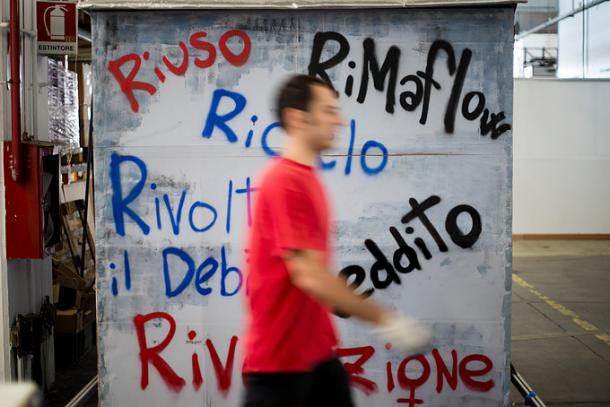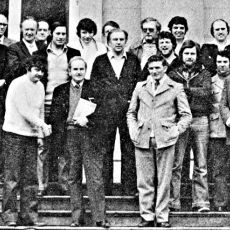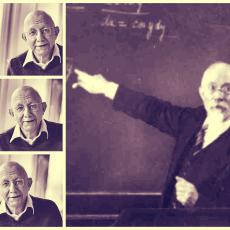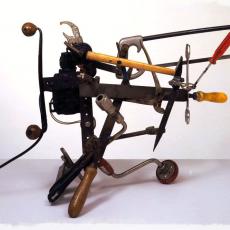RIMAFLOW WANTS TO EXIST!
An appeal of support to the self-managed factory Ri-Maflow in Milan, Italy.
This appeal in support of the self-managed factory Ri-Maflow in Milan, Italy has already received international support. Collective and individual support can be sent to : rimaflowvuolevivere@gmail.com. All donations to help the factory continue are most welcome.
The economic crisis has led to deep social transformations and job losses all over the world, destroying the plans and expectations of millions of men and women. The answers given so far have been completely negligible from a social point of view and favourable only to the profits of the financ capital, with no positive repercussions on the real economy.
Many have opposed these policies so far: from the Occupy mobilizations in the US, to the struggles of workers in Southeast Asia, peasants in Africa and Latin America, students in Quebec, from the movements in defence of migrant rights, to those against the debt, to women’s movements, to the movements of people who are denied every right. The experience of Ri-Maflow in Italy stands in full solidarity with this international movement that, in spite of its efforts, has not managed to challenge the capitalist management of the crisis.
Ri-Maflow is a workers’ cooperative in Trezzano sul Naviglio (Milan). Until 2012 it has been the seat of the company Maflow, which made profits, fulfilled orders and ran factories all over the world. When the company shut down, the workers did not give up and decided to occupy the plant, beginning a completely new experience, based on self-management and democracy. They looked at the experiences of the Argentinian fabricas recuperadas and the Sem terra movements in Brasil. “Occupy, resist and produce” has become their motto, too.
Much has been done in just one year and a half: the disused workshops have started operating again, a "Town of another economy" has been realized, an alternative marketplace has been created, together with cultural and performing art classes and a place for “outside the market” distribution in collaboration with the association SoS Rosarno, created in Calabria (a southern region of Italy) to free migrants from the exploitation in orange plantations.
In the very same place that the owners of Maflow decided to shut down, the workers, together with young precarious workers, have created moments and spaces for a new sociality.
But this experience today wants to take a step forward and must do so, accomplishing the goal of operating the factory, in order to obtain a full wage for all the workers during 2015. For this purpose, Ri-Maflow is promoting a solidarity campaign with the minimum, but fundamental goal of buying a plant for the production and distribution of compressed air, which is necessary to activate all the machinery.
Achieving this goal would be an important step not only for Ri-Maflow workers, but for all those who want to work on a project of self-management, of opposition to austerity, and of defence of labour rights. For this reason, we believe that it is important to support this campaign. As academics, artists, social and political activists, media and communication workers, simple citizens, we want to say out loud that RI-MAFLOW WANTS TO EXIST.
First signatures
- Joao Pedro Stedile, Movimento Sem Terra, Rio Grande do Sul, Brazil
- Ken Loach, film-maker, London, Britain
- Frei Betto, liberation theologist, São Paolo, Brazil
- Themba Chauke, Landless People Movement - Via Campesina, South Africa
- Andrés Ruggeri, Open faculty programme, University of Buenos Aires, Argentina
- Plácido Peñarrieta, CHILAVERT Artes Gráficas y Red Gráfica Cooperativa, Buenos Aires, Argentina
- Gladis and María del Valle, Hotel BAUEN, Buenos Aires, Argentina
- Silvia Díaz, Cooperativa LA CACEROLA y FACTA, Buenos Aires, Argentina
- Juan Martín Pereyra, Cooperativa Restaurant LOS CHANCHITOS, Buenos Aires, Argentina
- Daniel Zakuski, Universidad de los Trabajadores, IMPA, Buenos Aires Argentina
- Patricia Acha, coop. LA YUMBA, Buenos Aires, Argentina
- Pedro Sánchez and Fernando Rodriguez, Coop.TEXTILES PIGUE’ Buenos Aires, Argentina
- Enrique Iriarte, Coop. 19 DE DICIEMBRE, Buenos Aires, Argentina
- Osvaldo da Costa Neto, Fábrica FLASKO’, San Paolo, Brazil
- FRALIB, ex Unilever, occupied factory, Marseilles, France
- Mondeggi Bene Comune, farms without owners, Florence, Italy
- OZ-Officine Zero, fabbrica recuperata, Rome, Italy
- Socrate, migrants homes Associazione Solidaria-Netzanet, Bari, Italy
- S.O.S Rosarno, produttori and braccianti Piana di Gioia Tauro, Italy
- VIO.ME , occupied factory, Salonika, Greece
- Assemblea generale ‘Encuentro Sudamericano La Economía de los Trabajadores’ c/o Textiles Pigué, Buenos Aires, Argentina
- Gilbert Achcar, SOAS, University of London, Britain
- Giso Amendola, University of Salerno, Italy
- Bruno Arpaia, writer, Milan, Italy
- Cinzia Arruzza, The New School, New York, USA
- Dario Azzellini, Workerscontrol.net and University of Linz, Austria
- Walden Bello, Focus on the Global South, Bangkok, Thailand
- Johanna Brenner, University of Portland, USA
- Pino Cacucci, writer, Bologna, Italy
- Salvatore Cannavò, journalist, Rome, Italy
- Vivek Chibber, New York University, New York, USA
- Simon Chritcley, New School for Social Research, New York, USA
- Antonio Conti, Rete ONU-operatori nazionali USAto, Rome, Italy
- Elvira Corona, journalist, author of ‘Lavorare senza padroni’, Cagliari, Italy
- Edenise Da Silva Antas, University of Serra dos Orgaos, Brasil
- Erri De Luca, writer, Rome, Italy
- Nicoletta Dosio, Movimento No Tav, ValsUSA, Italy
- Valerio Evangelisti, writer, Bologna, Italy
- Sara Farris, Goldsmiths, University of London, Britain
- Angelo Ferracuti, writer, Fermo, Italy
- Nancy Fraser, New School for Social Research, New York, USA
- Andrea Fumagalli, University of Pavia, Italy
- Mabel Grimberg, Directora Instituto Ciencias Antropologicas, University of Buenos Aires, Argentina
- Nancy Holmstrom, Rutgers University, Newark N.J., USA
- Statis Kouvelakis, Kings College, London, Britain
- Michael Lowy, author, University of Paris V and CNRS, Paris, France
- Aldo Marchetti, sociologist and author of ‘Fabbriche aperte’, Milano, Italy
- Ana Marssani, University of the Republic, Uruguay
- Sandro Mezzadra, University of Bologna, Italy
- Antonio Montefusco, University Heinrich-Heine, Düsseldorf, Germania
- Toni Negri, già University of Padua, Italy
- Florencia Partenio, Carrera de Relaciones del Trabajo, Univ. Naz. A.Jauretche, Argentina
- Charles Post, professor CUNY, New York, USA
- Alberto Prunetti, writer, Piombino, Italy
- Gabriele Polo, journalist, Rome, Italy
- Re:Common, sottrarre risorse naturali a finanza and mercato, Rome, Italy
- Anabel Rieiro, Università della Repubblica, Uruguay
- Pierre Rousset, Europe solidaire sans frontières, Paris, France
- Sally Rousset, Babaylan-Femmes philippines en France, Paris, France
- Catherine Samary, economist and global justice activist, Paris, France
- Heike Schaumberg, University of Manchester, Britain
- Marina Sitrin, City University, New York, USA
- Richard Smith, essayist, New York, USA
- Cecilia Strada, presidente di Emergency, Milano, Italy
- Peter D. Thomas, Senior Lecturer in Political Philosophy, Brunel University London, Britain
- Massimiliano Tomba, University of Padua, Italy
- Alberto Toscano, Goldsmiths, University of London, Britain
- Eric Toussaint, presidente CADTM, Lièges, Belgium
- Massimo Vaggi, lawyer and writer, Bologna, Italy
- Eleni Varikas, University Paris VIII and CNRS, Paris, France
- Guido Viale, journalist and essayist, Milano, Italy
- Gabriel Videla, geographer, University of Buenos Aires, Argentina
- Wu Ming, writers’ collective, Bologna,Italy
- Alex Zanotelli, missionary comboniano, Naples, Italy






Comments
Post new comment